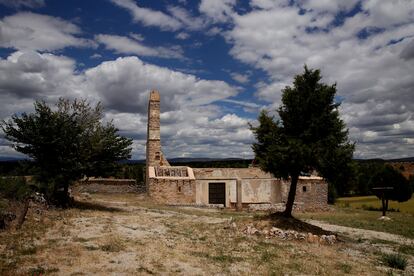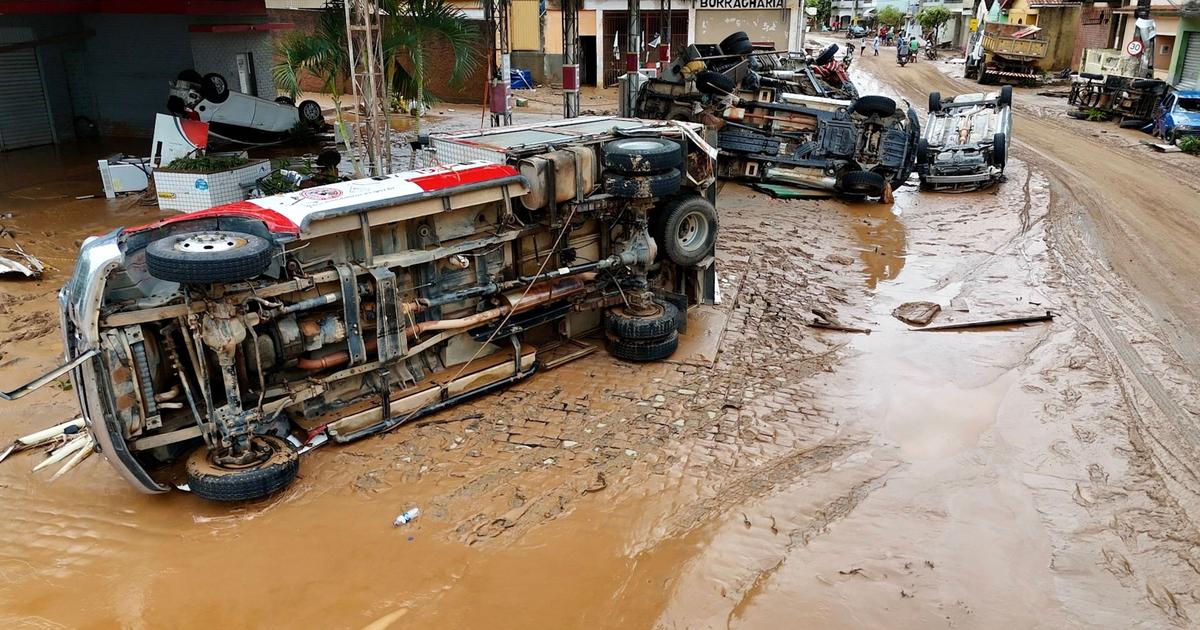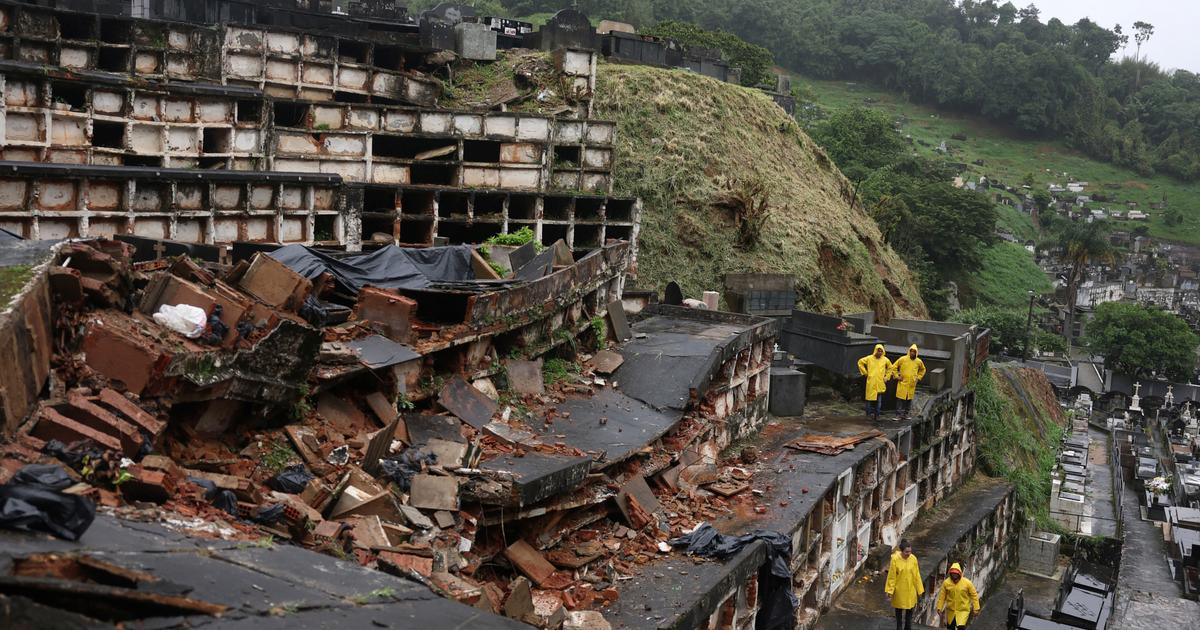The two and a half hours that the drive from Madrid to La Mallona lasts are spent flying in the company of Julia Soria.
Just the account of her life gives conversation for a while.
She was born in 1948 in that tiny village in the province of Soria to which we went, but two months later her parents emigrated to Barcelona.
At the age of 14, she had to drop out of high school and start working to help out at home.
In 1973 she fell in love with a French man, went to live in Paris and got married.
In 1975 she moved her husband to Rio de Janeiro and she went with him.
She lived there for 15 years, happy in that country "where the joy of the people" dazzled her and working in French multinationals based in Brazil, until she got divorced and decided to return to Spain in 1990. She found a job in Madrid and went there .
But that was a letdown: “Not for Madrid,
it's that I didn't know anyone and I was alone," she says.
In 1993 she met her current partner in Barcelona and moved again.
But in the nineties, and at the age of 45, it was no longer so easy for her to find a job, so she decided to study Translation and Interpreting at Pompeu Fabra University.
After graduating, she became a translator, "a job so poorly paid that you end up losing motivation."
In 2010 she enrolled in the School of Writing of the Ateneo de Barcelona.
And now, at the age of 73, the Alba publishing house has just published her first novel,
“A job so poorly paid that you end up demotivating yourself”.
In 2010 she enrolled in the School of Writing of the Ateneo de Barcelona.
And now, at the age of 73, the Alba publishing house has just published her first novel,
“A job so poorly paid that you end up demotivating yourself”.
In 2010 she enrolled in the School of Writing of the Ateneo de Barcelona.
And now, at the age of 73, the Alba publishing house has just published her first novel,
Campos azul
, whose protagonist is a woman who returns to the tiny town of Soria where she was born after many comings and goings around the world.
So here we are.
In a car back to the village where it all started 73 years ago.
The writer traveled to Madrid last Tuesday to present her book and we took the opportunity to make a quick getaway the next day to La Mallona.
“From Catalonia it is hell.
I can't come and go during the day, communications with the plateau are a disaster, ”she laments.
From Madrid it is easier, because the so-called Duero Highway has already arrived in Soria, that project that was launched 25 years ago to connect the emptied Spain and that nobody knows when it will end.
However, things get complicated at La Mallona: the town can be seen perfectly from the road, but the GPS gets confused at the motorway exit and there are no signs indicating how to get there.
Why, if no one lives anymore.
“Well… nobody doesn't.
There are two people who live all year round and a few keep their houses open for weekends or vacations.
Like me”, clarifies Soria.
When she was born there were about thirty families.
In the last register there are seven registered people.
“A pity.
This has been abandoned to its fate for a long time, ”she relates.
“In the seventies it was already clear that it was going to disappear.
It was a land of smallholdings that was very hard to work in and everyone rushed to the cities as soon as they could.
By the end of the 1980s there was almost no one left.”
“In the seventies it was already clear that it was going to disappear.
It was a land of smallholdings that was very hard to work in and everyone rushed to the cities as soon as they could.
By the end of the 1980s there was almost no one left.”
“In the seventies it was already clear that it was going to disappear.
It was a land of smallholdings that was very hard to work in and everyone rushed to the cities as soon as they could.
By the end of the 1980s there was almost no one left.”
Family photos in the living room of Julia Soria's house in La Mallona.
Jaime Villanueva Sanchez
But the writer's face suddenly lights up.
We are entering La Mallona and you can see the joy in her whole body.
She hasn't been there for a year.
Why is she so attached to a town where she has never actually lived?
“I have not lived and possibly I will never live, but I spent wonderful times with my grandparents and possibly my character was forged more here than in the city.
The countryside dazzled me every time we came from that dark house my parents had in Barcelona”, she explains.
Perhaps that is why she revolted when her mother put her grandparents' house up for sale after becoming a widow.
“That was in 2013. My brother and I came to tidy it up before showing it to a potential buyer from Zaragoza, but our hearts fell at her feet.
We couldn't get rid of that place where we had been so happy.
Instead of that,
The house has been beautiful after the restoration.
The kitchen maintains the old basketed chimney that occupies the entire ceiling.
And where there used to be a barn, there is now a large room with several beds.
“Look, Grandma.
One of the most influential people in my life,” she says, pointing to one of the photos hanging on a wall in the living room.
Memories of her are triggered in the house.
"That's why I didn't want to sell it!"
Not because they have a second residence to spend weekends or holidays –”how difficult it is to get here from Barcelona!”– nor as a quixotic act to avoid the total depopulation of the town.
What she wanted was to keep her memory fresh.
Rebel against oblivion.
Go back to walk through those fields that revive him so much.
Why
Blue Fields?
“The expression is not mine, it is Proust's.
I discovered it just after finishing the novel and it was immediately clear to me that this had to be the title.
When the sun beats down everything here looks blue.
I saw everything blue when I was little.
View of the church of La Mallona.Jaime Villanueva
The novel is also that.
Not a manifesto against the emptied Spain or a praise of rural life, but "an allegation about memory", as he says on the lapel.
The vindication of a way of living and being in the world through writing.
The story of a woman who returns to town to sell her grandparents' house and that leads her to recall the time she spent with them when she was 12 years old.
Her own life turned into literary matter.
And why has literature come so late to that life?
“It has always been there, what happens is that until now I had never considered writing a book.
There are people who ask: 'Hey, what audacity of yours to publish a novel at this age'.
'Dare why?
What does age have to do with this?', I always answer”.
Perhaps also because when she was young she did not have it easy.
He could not study beyond elementary school and at home he never saw a book, although he was lucky that his first job was "as a stonecutter for everything" in a publishing house and there they discovered that he had a privileged eye to catch typos, so They put her as a proofreader and she became fond of reading.
"Visual memory and facility for language," she explains.
Not only ease, but also taste:
each month he reserved a tiny part of his salary to buy books and study English and French.
“And as a child she wrote for me.
About what happened to me or caught my attention.
Not a diary, more like annotations.”
Walking through La Mallona you don't see anyone.
Although there are clues that someone has passed through there recently and plans to return soon.
Manicured gardens, a few closed blinds, some socks drying in a window, a table and a couple of garden chairs at the door of a house, some garbage too... "Looks like a ghost town, right?" whispers the writer very softly, as if fearing to wake up some spirit.
But she doesn't say sad.
“I see the fields and I get so happy!
Besides, I'm used to seeing this empty by now,” she says.
However, she is suddenly stunned in front of a door with a “For Sale” sign with a phone number on it.
“This was my uncle's house!
Maybe this is my cousin's phone."
Only the walls remain of the house.
“And who is going to want to buy this wreck?” she asks herself.








